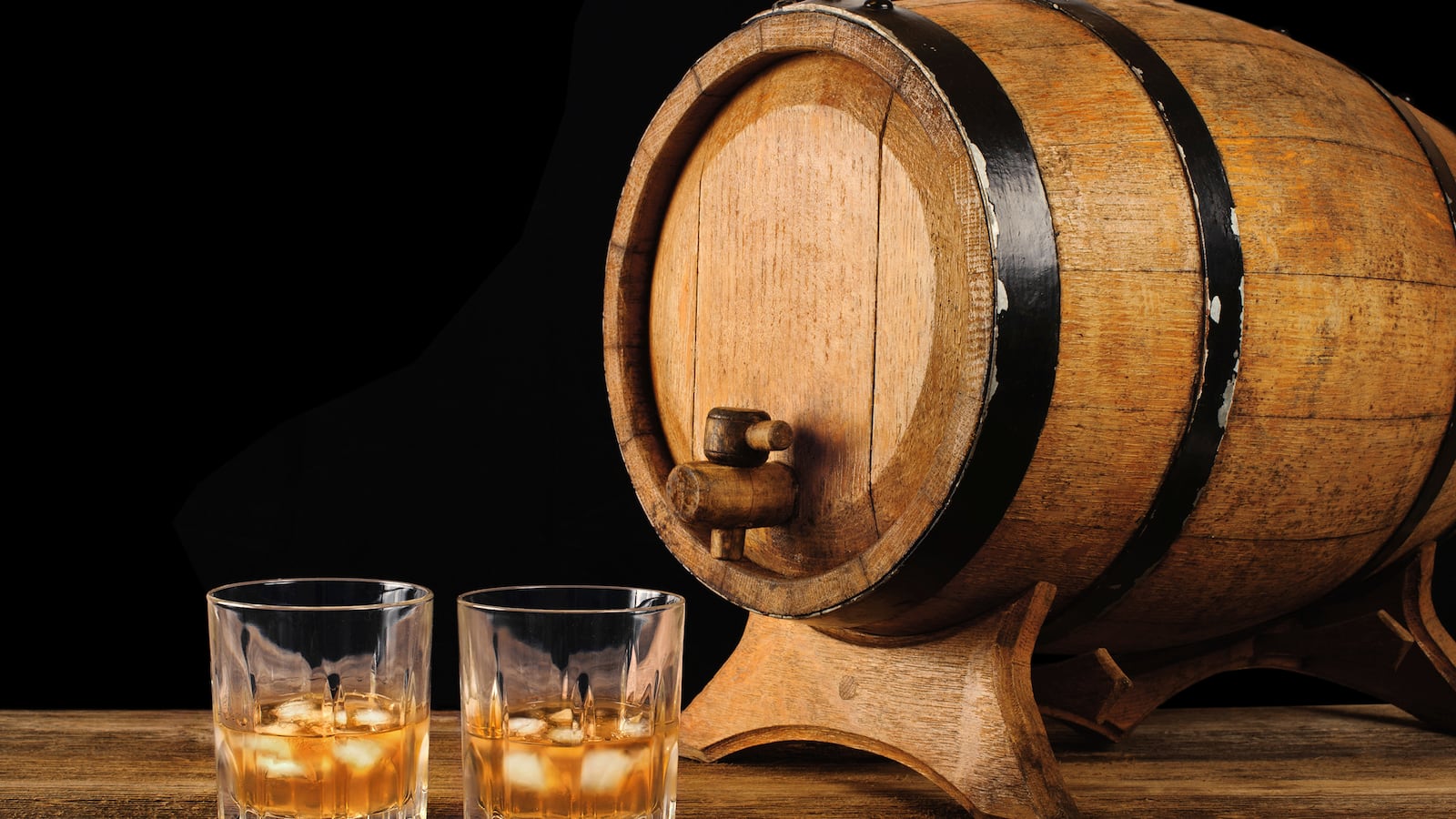I'm standing in a building called Bonded A Warehouse. From the outside it’s indistinct, with a beat-up loading dock in front of an empty parking lot in the rolling hills of Lawrenceburg right by the Kentucky River.
It's around 85 degrees outside but somehow becomes a cool 60-something just inside the first floor—no climate control here—where I stand below a seven-foot planked ceiling.
Eddie Russell, a 55-year-old man in a horizontally striped polo shirt and blue jeans, grabs his copper thief and plunges it into a dusty oak barrel.
He pulls it back out and slops some amber liquid into my glass. I drink the potent 110-proof (or so) bourbon and nod. It's fantastic.
“If you like what you taste, you can get the whole barrel.” Russell matter-of-factly tells me.
Don’t worry, he’s no crank and we haven’t broken into anyone’s property. This is not another whiskey heist.
Russell (along with his legendary father Jimmy) is one of the co-master distillers at Wild Turkey, one of the half-dozen or so major bourbon distilleries left in Kentucky. The rickety warehouse is actually a rickhouse, a place where barrels are stored and aged.
In fact, Bonded A is the oldest rickhouse on all of Wild Turkey’s campus, built in 1890 and now housing many of Russell’s most treasured barrels. The barrels that could very well go into being, as they say in the business, “private barrels.”
Many whiskey distilleries now let you (or, more likely, your favorite bar, restaurant, liquor store, supermarket, or big box even) hand-pick one-of-a-kind barrels of their bourbon.
These can be sold to customers, used to make special “house” cocktails, or even given away as gifts.
Countless bourbon enthusiasts are now traveling down to Kentucky to explore the opportunity, often buying a barrel on the spot, just like they might pick out a new car.
But what does “buying a barrel” actually mean?
No, I’m sorry to say, you won't get the full, 500-pound barrel delivered to your front door, no matter how cool that may sound. (Kegger!)
Instead, with around 53 gallons of liquid per barrel, and accounting for loss from the “angel’s share,” that one barrel will eventually turn into around 150-200 750 mL bottles.
In Wild Turkey’s case, if you’re interested in owning a barrel’s worth of booze, you simply schedule a visit, get yourself down to Lawrenceburg, and then let the Russells give you a tasting tour of Bonded A.
Find a barrel of their Kentucky Spirit or Russell’s Reserve you like—single barrels will naturally vary in both flavor profile and ABV due to how and where they age—and place an order.
One rub: you’ll need a liquor license, or an acquaintance with one willing to make the purchase on your behalf.
Costs will run you around $8,000 to $10,000, the same exact price as purchasing the equivalent number of bottles.
Approximately 60 days after your order, you’ll receive your bottles—with personalized tags—and you get to keep that empty barrel to boot. (Many stores use it as part of an endcap display, while bars tend to like to use their empty barrels as standing tables.)
“It’s a great way to engage our customers,” Beau Beckman, the barrel select manager at Buffalo Trace told me. “It enables us to develop personal relationships with them.”
His distillery has a similar program, allowing would-be private barrel buyers to come to Frankfort, Kentucky and meet with Master Distiller Harlen Wheatley to taste through the barrels.
They’re also willing to mail you some samples if you’re the kind of person with $10,000 to spend on a full barrel, but not enough time or airline miles to get yourself to Louisville.
Buffalo Trace offers private bottlings of their flagship Buffalo Trace, Eagle Rare, Blanton’s, and Weller as part of their program.
Likewise, Woodford Reserve allows prospective barrel buyers to come down and pick from their Distiller’s Select Personal Selection or Double Oaked Single Barrel By the Barrel (you’ll even get your name on a permanent plaque at the distillery).
For the thriftier among us, Jim Beam offered a slightly cheaper option just a couple weeks ago.
For the price of $200 you could visit the Clermont, Kentucky distillery, find a barrel of their Knob Creek you liked, then purchase four specially-labeled bottles from the batch. A BBQ lunch is tossed in gratis.
It sounds fun, sure, but private barrel buying is not a silly gimmick. Four Roses is perhaps the hottest bourbon-maker of the moment, having won four of the last five Whisky Distillery of the Year awards.
This is predominantly due to the massive popularity of their private barrel program. Also located in Lawrenceburg, the actual brand name “Four Roses” has been around since 1888.
But despite its popularity at the time, owner Seagram’s discontinued it in the U.S. in the 1950s. In the following few decades quality plummeted and it soon became known as a blended, “rotgut” whiskey, the most bottom of the bottom shelf.
In 2002 Japanese beverage company Kirin decided to revive the once-proud Four Roses brand name after acquiring the trademark.
They set up a private barrel program initially as a play to revitalize the brand with liquor store owners who might not have realized the days of rotgut were over, and quality product was yet again coming out of the warehouses in Coxs Creek.
“We worked with each retailer to choose their own barrel and create their own label for the side of the bottle,” Patty Holland, Four Roses national sales director told me. “It insured us more floor space in these outlets—thus, obviously, more exposure in an account.”
These ‘Private Selection Barrel Proof Program’ bottles have been spectacularly received by bourbon geeks, who have stalked out retailers across the country like Julio’s, Liquor Barn, even Kroger’s, and bars like Haymarket in Louisville and Elixir in San Francisco, simply trying to find these limited edition Four Roses private barrel offerings.
In fact, with this single strategy, Four Roses inadvertently created a model for up-and-coming distilleries who wanted to burst onto the crowded bourbon scene.
Located in the Appalachia region of West Virginia, Smooth Ambler is most famously known as an “independent bottler.”
This means they sometimes buy other distilleries’ “juice,” cultivate it, and bottle it under their own Old Scout labels. (This is not a dirty secret.)
Since Smooth Ambler has just been around since 2009, this is really the only way they can get older bourbons and ryes onto the market at this point in time.
Offering private barrels has proven to be the savviest way they’ve made a name for themselves in big cities like New York (where it was sold at Astor Wines) and Chicago (Kenwood Liquors), whether they intentionally meant to or not.
“I can honestly say we didn’t think of it as a marketing position. It was born out of a desire to do something new and fun for our business,” notes John Foster, their director of sales.
Utah’s High West, a fellow craft distiller, has taken that same sentiment to heart.
As part of their Barrel Select program they only release around 50-70 barrels a year to the public, but many of them are highly experimental, the kinds of oddball offerings that might make the major distilleries blush.
Just recently High West offered a single barrel of their Rendezvous Rye finished in Vermouth barrels. A mere 273 total bottles were able to be produced.
“It’s really about what our customers get out of this program,” High West’s owner David Perkins, told me. “It’s all about offering one-of-a-kind barrels to those who enjoy our whiskey and have supported us over time.”
Still, there are drawbacks to these numerous private barrel select programs. With barrel shortages looming, there are certainly not infinite private barrels to go around. Just like High West, most of the aforementioned distilleries release, at most, one-hundred private barrels a year, which guarantees that certain fans are going to feel left out when they aren’t able to score one.
Even worse, in my opinion, is that distilleries are unwittingly diminishing the perceived value of their “regular” products, the core of their million- and billion-dollar businesses.
Why would consumers want a “normal” bottle of, say, Four Roses Yellow Label when they can search far and wide to find something more limited, special, and, quite frankly, better tasting?
Consumers today crave uniqueness, if not rarity--especially the geeks, collectors, and hoarders among us who want something that, bluntly, others don’t have.
In fact, such was the success of Smooth Ambler’s private barrel program—which pretty much took them from being “nobodies” in West Virginia to releasing products sometimes as coveted as those from the old guard in Kentucky—that they had to suspend the program just to have time to fulfill all the current demand.
Then again, even with that little snag, the higher-ups at Smooth Ambler aren’t exactly complaining.
“It’s been a wonderful ‘problem’ to have,” Foster told me. “And been a blessing to our brand and to our business.”





